- News
- Reviews
- Bikes
- Components
- Bar tape & grips
- Bottom brackets
- Brake & gear cables
- Brake & STI levers
- Brake pads & spares
- Brakes
- Cassettes & freewheels
- Chains
- Chainsets & chainrings
- Derailleurs - front
- Derailleurs - rear
- Forks
- Gear levers & shifters
- Groupsets
- Handlebars & extensions
- Headsets
- Hubs
- Inner tubes
- Pedals
- Quick releases & skewers
- Saddles
- Seatposts
- Stems
- Wheels
- Tyres
- Tubeless valves
- Accessories
- Accessories - misc
- Computer mounts
- Bags
- Bar ends
- Bike bags & cases
- Bottle cages
- Bottles
- Cameras
- Car racks
- Child seats
- Computers
- Glasses
- GPS units
- Helmets
- Lights - front
- Lights - rear
- Lights - sets
- Locks
- Mirrors
- Mudguards
- Racks
- Pumps & CO2 inflators
- Puncture kits
- Reflectives
- Smart watches
- Stands and racks
- Trailers
- Clothing
- Health, fitness and nutrition
- Tools and workshop
- Miscellaneous
- Buyers Guides
- Features
- Forum
- Recommends
- Podcast
news
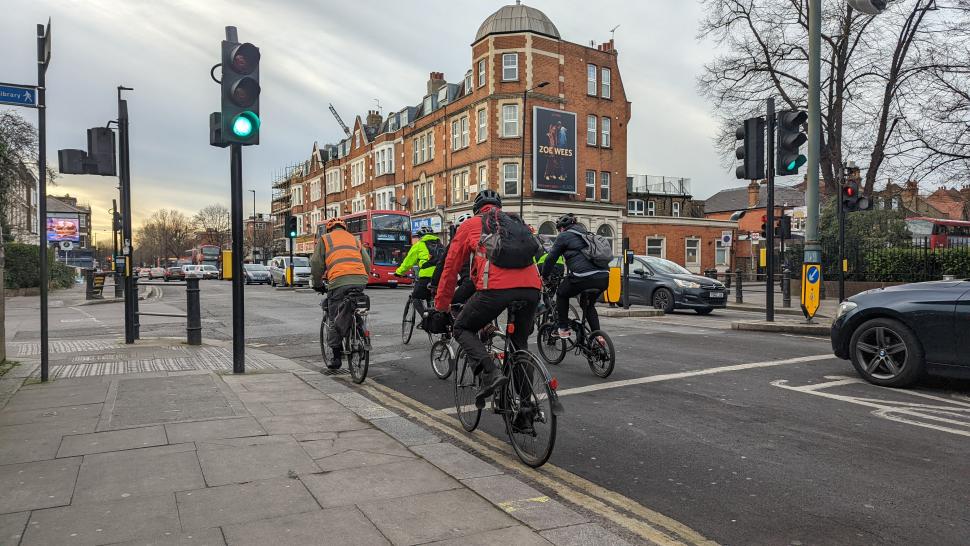 Cyclists at traffic lights, London © Simon MacMichael
Cyclists at traffic lights, London © Simon MacMichael“A second-hand bike costs the same as two tanks of fuel”: Cyclists react to “joke” survey which found that almost half of Brits believe they can’t afford to buy a bike
“How much is motoring insurance, tax, MOT, servicing, repairs, and fuel when you add it all up?” That’s the question currently being posed by baffled cyclists across the UK, after a new survey examining attitudes towards cycling found that almost half of Brits believe they cannot afford a bike, with yesterday’s story on the somewhat contentious study attracting hundreds of confused comments on road.cc and across social media.
The survey was carried out by BHN Extras, the parent company of Cyclescheme, the UK’s largest provider of access to the Cycle to Work initiative, as part of its annual research into perceptions of, and barriers to, cycling in the UK ahead of Cycle to Work Day on 1 August.
Gathering responses from 2,000 people employed across a range of sectors in the UK, the study found that 49 per cent of those surveyed believe that they are not currently in a position to buy a bike outright.
A quarter of those consumers also stated that it would take at least six months to save to purchase a bike, with 50 per cent noting that they would be most likely to buy a bike by splitting the cost and 22 per cent stating that the cost of accessories acts as a deterrent to encouraging them to cycle to work.
Meanwhile, concerns about the stereotypical image of a cyclist also featured prominently in the survey, with 58 per cent of respondents believing that they “don’t fit the bill” of what a cyclist apparently represents.
However, it’s the survey’s headline finding – that almost half of Brits think they can’t afford to buy a bike (though, it must be noted, the survey doesn’t attempt to ascertain why that’s the case) – that has fuelled quite the conversation online.
“That’s ridiculous,” X/Twitter user Chrissetti said in response to yesterday’s story. “It might be too expensive to buy a brand-new bike, but you can get second-hand ones dirt-cheap. You’re not going to win the Tour de France on it, but it’ll be good enough as a commuter bike.”
A road.cc reader concurred: “What a joke. I spent £50 on a second-hand mountain bike in 2011 which I use to commute. I still use it now, and would reckon I’ve done 10,000 miles on it in total. No expensive gear, just helmet, gloves, lights, and waterproofs (which I’ve hardly ever used as it rarely rains enough to warrant it).
“Anyone new to cycling doesn’t need to spend thousands of pounds initially until they know they will continue and want to upgrade.”
Meanwhile, another road.cc reader offered up this handy piece of buying advice: “Buy an early 90s Kona MTB, put some slicks on it. Best commuting bike you’ll ever own. Job jobbed.”
I paid £110 for this bicycle in 2011. It is now 50 years old. I use it for commuting - about 18 miles a day. It works perfectly and has required almost no maintenance. pic.twitter.com/DKKd2mYxTh
— Robert Rhodes (@ra_rhodes) August 2, 2024
Over on Facebook, Chris Alston added: “There are many bike recycling projects across the UK. We don’t all need to buy new. There are some great second hand or pre-loved refurbished bikes available for a good price. The second-hand market has been flooded with bikes that were snapped up during the early stages of the pandemic.
“The Cycle to Work scheme is always an option for those whose employers are signed up. Cycling UK has a Cycle Friendly Employer Scheme to encourage businesses to make the necessary changes to support those who wish to cycle to work. They also have various programmes to help new or returning cyclists build up confidence, fitness, and learn new skills such as cycle maintenance. There’s help available. Some local authorities have certain schemes too.”
While the relatively low cost of buying a bike (unless you’re in the market for the latest S-Works, of course) was a common feature of many of the replies to the story, some readers couldn’t help but point out that, of the 49 per cent who claimed they don’t have the funds for a bike, a decent proportion would be more than happy to spend their hard-earned wages on buying, maintaining, fuelling up, taxing, and insuring a car.
One road.cc reader said: “Given that there were 41.2 million registered vehicles in the UK at the end of 2023, and that according to the 2021 census, there were 37.5 million people of working age, it would be interesting to know how many of those surveyed don’t think they can afford a bike because they already spend a good proportion of their income on owning a car.”
“Can’t afford to buy a bike? You can get one for about £100, and it costs nothing to run. Yet they can afford to run a car, which costs thousands to keep on the road?” asked Lee Jones on Twitter.
“Going with total bullshit for that,” added SCo. “You can pick up a working bike off Facebook marketplace for £50 every day. Even if you budget another £50 for service, that’s about two tanks of fuel, ride to work for a few weeks and the bike has paid for itself.”
“How much is motoring insurance, tax, MOT, servicing, repairs, and fuel when you add it all up?” asked Pooka, a question answered by the Twitter account ‘Yeah But Cyclists’: “Can’t afford a bike which could cost as little as £300 (or even less second-hand) and virtually nothing to maintain or run, but they can afford £1,000+ per year to maintain and run a car?”
However, not everyone was up in arms about the survey’s main finding, with some criticising the rising prices associated with the bike industry in recent years.
“The industry has been pushing prices up and up for years,” said Tom Stringer on Twitter.
Facebook user Paulo also added: “Cycling has become a stupidly expensive sport, it was never very cheap, but nowadays it is too much.
“Some years ago, a reasonable/good bike would have components of some quality and would cost a maximum of £500. Nowadays with £500 you can barely buy anything with two wheels. Something will have to be done to counter this situation and make cycling accessible to the masses again.”
Some, meanwhile, noted that there are other reasons – beyond costs – that prevent them from commuting by bike.
“I would love to cycle to work but the idea of 20km down the A57 in rush hour terrifies me... It’s definitely the idea of sharing space with white vans and w***panzers that puts me off,” said one road.cc reader.
However, others were quick to note that the survey’s findings, detailing the arguably prohibitive costs of cycling, were published by a company whose aim is to encourage people to buy new bikes at a discounted rate.
“Putting aside all the comments regarding how many and who can or can’t afford a bike (in reality anyone who wants a bike can have one, whether it’s bought new, used, or received from charitable source), the upshot is that this so-called ‘research’ was commissioned by a company that has a financial interest in getting as many people as possible to repeatedly buy new bikes via a salary sacrifice scheme, within which they charge one of the highest commission fees in the industry,” said one road.cc reader.
“As with most ‘surveys’ the organisation paying the bill gets the outcome they ask for.”
This led on to a broader discussion surrounding the Cycle to Work scheme in general, which has faced a turbulent period in recent months, as local bike shop owners and traders united earlier this year to criticise a system that they believe is “too complicated”, damaging to retailers, no longer fit for purpose to get more people cycling to work, and in “need of urgent systematic change”.
“The trouble with the Cycle to Work scheme is that most low earners are not allowed to use salary sacrifice because it would take them below the National Minimum Wage,” noted a road.cc reader. “Low earners cannot buy a bike tax-free through Cyclescheme. The government must fix this.”
And Colin McCullough on Facebook said: “The Cycle to Work scheme is bad for local bike shops due to the fees, and privileges higher earners, in company employment linked to the scheme. It discriminates against low paid, unemployed, retired, self-employed... Why not simply cut the VAT rate on bikes? And/or have a rental/leasing scheme, with insurance and maintenance included? Creativity needed from government?”
“The cycle schemes can’t take you below minimum wage, and given how much the minimum wage has gone up in relation to wages in general I wouldn’t be surprised if people can’t afford to take advantage of it,” said Sean.
“However, nearly every major bike retailer has sales on right now, you can pick up a decent bike for not much in the grand scheme of things. Even if you had to pay interest, the money saved on fuel would likely be enough to cancel it out.”
What do you think? Is cycling becoming unaffordable, hindered by a Cycle to Work scheme which does little for lower earners? Or are there more than enough cheap and second-hand bikes floating around to get the UK cycling to work? Let us know in the comments…
After obtaining a PhD, lecturing, and hosting a history podcast at Queen’s University Belfast, Ryan joined road.cc in December 2021 and since then has kept the site’s readers and listeners informed and enthralled (well at least occasionally) on news, the live blog, and the road.cc Podcast. After boarding a wrong bus at the world championships and ruining a good pair of jeans at the cyclocross, he now serves as road.cc’s senior news writer. Before his foray into cycling journalism, he wallowed in the equally pitiless world of academia, where he wrote a book about Victorian politics and droned on about cycling and bikes to classes of bored students (while taking every chance he could get to talk about cycling in print or on the radio). He can be found riding his bike very slowly around the narrow, scenic country lanes of Co. Down.
Latest Comments
- hawkinspeter 12 min 33 sec ago
Another vote for Bont, here. I bought a new pair of wide-fitting Bont Riot G MTB shoes this year and they're perfect.
- RobD 18 min 23 sec ago
It's a real shame, his bikes seem incredible, I've dreamt of owning one for a long time. Really sad that he's had customers let him down repeatedly...
- David9694 1 hour 5 min ago
Car smashes into wall near Exeter Cathedral...
- David9694 1 hour 15 min ago
Driver Who Broke Runner's Spine in Three Places Praised for Waiting Around Until Help Arrived
- Steve K 1 hour 52 min ago
Even if this gets to 100,000 signatures, I suspect the Petitions Committee will simply say there has already been a debate, so no need for another...
- Prosper0 9 hours 43 min ago
Just doing the Lord's work in case anyone's interested in this product. This Mucoff Pump is a £100 rebrand of an £85 Rockbros rebrand of a £60...
- mdavidford 10 hours 31 min ago
Obviously it means 'springing out of the bunch' on a critical sector. Or maybe it's referring to the time of year.
- David9694 11 hours 20 min ago
Woman taken to hospital after flipping car onto roof in Trowbridge...
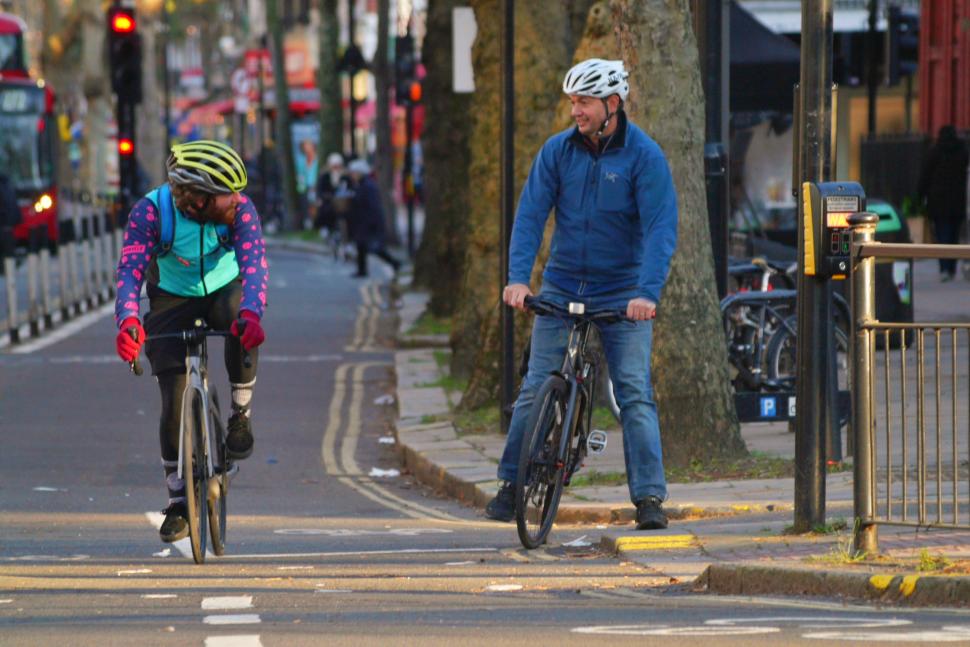
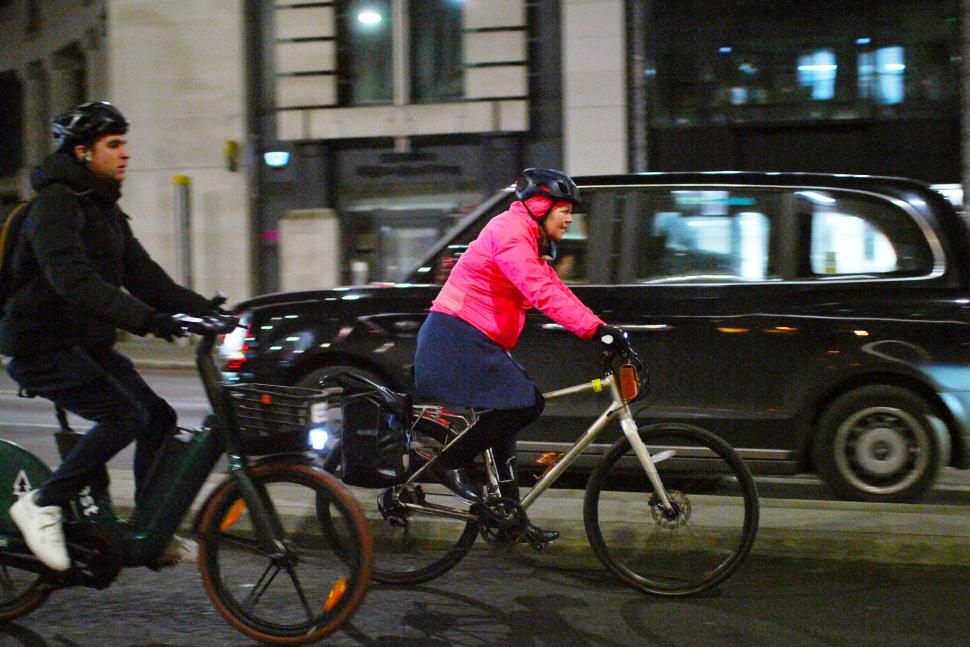
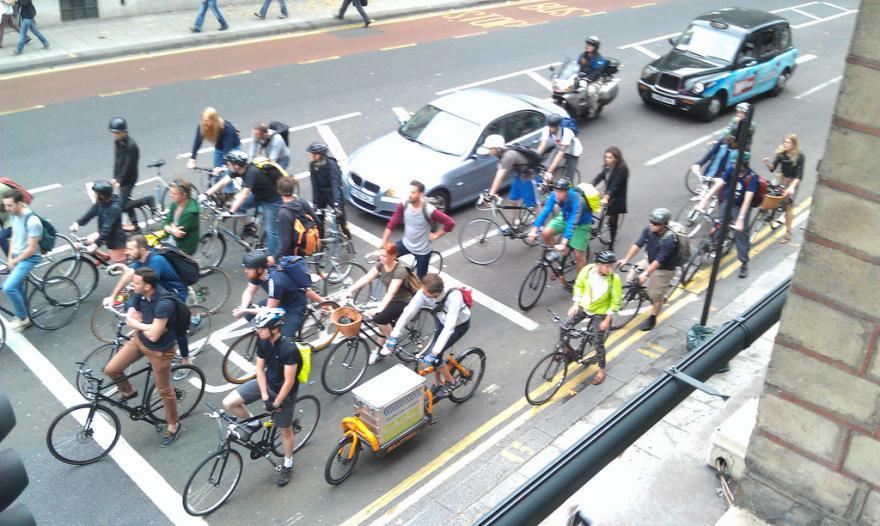
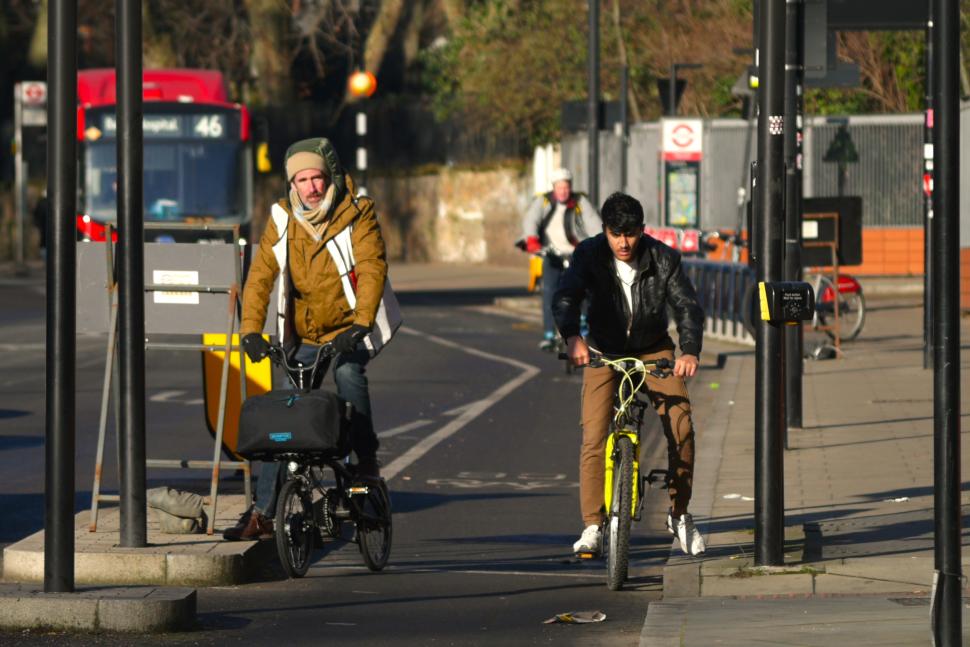
Add new comment
97 comments
Something like "Billy the Fish on a bicycle"?
Probably a 1x set up with 12speed cassette mixing road and mountain group elements.
Apparently it's business (road shifters) in the front, party (mountain bike derailleur/cassette) in the back.
Thanks - LOL, love it!
Depends what point they want to make
Cyclists are unimportant? - Cyclists are too poor to buy a car
Cyclists are part of the elite velominati controlling modern poltics - cyclists are rich,
I need an excuse not to cycle to work - bikes are too expensive.
What's a 12-speed mullet? Why is 27-speed triple better than one? OK, tend to agree with rest of your comment.
27-speed cheap bikes really are a pain to fix up, not least because they're used by folk who never clean chain or use acidic congealing oils so ruined chains wear out chainring teeth and jams in the cage which gets bent - so they come to me and I say how much the parts will cost retail.
Me - Suntour Ultra6 behind Shimano Biopace worked great till I couldn't get them anywhere, not even used. Have to admit, 22-speed Ultegra is nice - never under or over geared.
Oh, but the solution is so simple...
Just tax the bikes and treat them like cars.
That'll teach them pesky bikers rattling their nuisances on our motor roads!
I have 7 speed bike for commuting. I just bought a new shimano chain for <£5 inc postage and a SRAM cassette for <£10 inc postage.
Brake pads are a few pounds, my cartridge BB is more than 10 years old and works perfectly, the list goes on. Cost is nowhere near the top of the list when it comes to barriers to cycling.
Very similar. But you can diy. Many have no aptitude for diy or any kind, especially dirty, oily bikes. And don't have space to keep bike, tools, extra clothes, bags, locks, lights. Cost of bike includes cost of rent for large enough room in HOMO to keep it. Cordless angle grinders and cable cutters get through affordable chains and the cast iron railings if you use a £100+ Gold rated shackle lock
I bought my son a decent second hand Scott commuter bike with hub gears, dynamo lights etc. for £90 to save him driving to the train station and paying £9 per day to park. So it paid for itself in just 10 days.
But it doesn't have to be used. When I bought my new Brompton ( not a cheap bike) to use instead of the Underground I reckoned it would take 3.5 years to pay back the purchase price on saved underground tickets. And that was 10 years ago, so I am considerably quids in now.
Lots of cheap bikes around BUT...
Riding a bike regularly is not cheap. Everything wears out quickly. chains, cassettes, bottom brackets, freehubs, tyres, brakes, wheel rims.. nothing seems to last more than a couple of thousand miles.
Mile for mile my bikes cost more to run than my car.
But a 9 speed hybrid with disc brakes wouldn't be expensive to run.
Even a low mileage rate on use of a car is about 50 p a mile. I do 50 miles every Sunday. It's not costing me £25 even including cake.
If you cycle it is scientifically proven that there is no practical limit to how much cake you can eat (allegedly), so that is a lot of cake.
Sadly not at my speed...
I find adding a cup of tea helps with faster eating.
I find I can eat cake (or chocolate) even on days when no cycling has occured, so grams of cake per 100km is infinite on non cycling days. why does it need a limit on cycling days?
But... the insulin resistance resulting from that carbohydrate overload kills you even if you're apparently fit, fast, healthy. Ask me how I know... three resuscitations on pavement outside front door
What? 'Nothing seems to last more than a couple of thousand miles'. Are your bikes made from play doh?
'mile per mile my bike costs more to run than my car'. So after you have paid, tax, insurance, MOT and servicing, depreciation and fuel and cleaning costs, the car costs less than the cycle to run?
Yes chinese parts probably are made form play doh. Cleaning costs? I drive a 15 year old diesel. It costs me bugger all to run compared to my bikes.
Everyone's experience is different of course but I ride about 8,000-10,000 kms a year spread across three different bikes; I don't keep a strict record of my expenditure but I very much doubt I spend more than £250 a year on parts and peripherals. When we had a car the insurance alone, on a very small car, cost nearly twice that, a parking permit for our street is now nearly £250 a year, servicing and MoT could be more or less guaranteed to add a couple of hundred or more so we were looking at nearly a grand before we'd put a drop of fuel in it.
Do you cycle along the seabed?
In that case I guess you must be relatively hard on your equipment. A little preventative maintenance (cleaning rims, lubing chain) may be a worthwhile investment. If you regularly ride in wet weather then full length mudguards make a huge difference.
I may get through a 9 speed chain in 2,000 miles (sometimes a cassette too, total cost about £50) but the kool-stop pads, tyres and chainrings last at least 3x as long and wheels well over 10,000 miles. And that is on the bike that does winter and wet weather commuting and riding, often on mucky country lanes. Parts lasted longer when most of my riding was on urban streets and decent roads. After 4 winters and about 20,000 miles the rear derailleur got reluctant to shift. I think it cost me £35 for the LBS to fit a replacement.
Well I guess cost would depend on whether you ride a piece of unmaintained crap or not. My winter bike is a lowly Sora nine speed with mudguards but a rear derailler is considerably more than £35. Anyway derailleuers are not the issue. Even with regular cleaning I rarely get more than the following:
Chain 2500 miles.
Casette (2 maybe 3 chains) 5000-7500 miles
Brake pads 3000 miles
Rear hub 5000 miles
Bottom bracket 8000 miles
Wheels 10000 miles - rims wear way faster than they used to now everything's made in china.
Tyres 5000 miles, sometimes a lot less
Tyres are a biggy. They're typically £30 each last less than 5000 miles, my car tyres are £120 each and last 30,000 miles easy.
10,000 miles a year probably equates to about £300 in parts. More than the £50 it typically costs me to service my car at the same mileage.
Last year my car tax £30 and my insurance was £70. My bike insurance was over £200 for two bikes.
Riding a bike through winter is not cheap.
Parts for my summer bike are 3 times as expensive, so it doesnt get anywhere near rain.
I never said cycling couldnt be cheap but for many of us it is not.
So tyres for your bike cost you £60 per 5000 miles and tyres for your car cost you £480 per 30,000 miles. That means tyres for your car cost you £80 per 5000 miles. I'm no mathmatician but that's not cheaper as far as I can see. Also, assuming as you're making the comparison with your bike insurance you must have at least TPF&T on your car, where do you live and how cheap is your car for insurance to be £70 a year? And £50 for servicing costs for a 10,000 mile a year car? I can't think of any garage nowadays that would charge less than £100 just as a basic fee, before any corrective repairs are made.
That's what I paid for my new Sora RD a couple of months ago. Are you calling me a liar? Tweeks have them listed for £30 for SS & £33 for GS.
Comparing bicycle tyres with car tyres is futile, like comparing household gas tariffs with electricity or cheese with chocolate.
Car insurance for £70 and £50 to service it - now I know you're living in a different world to most of us. Is it made of Lego?
It can be. I've been doing it, and on crappy country lanes, for 16 years. Or do you think I am telling porkies about that too?
I'm only giving my costs so people can see that it's perfectly possible to run a decent road bike without paying a fortune.
£70 car insurance???
£50 to service a car ???
5000 miles for tyres would be at least two years of commuting, which works out at £15 per year. If that's not cheap, I don't know what is.
£70 for isurance? Not in a million years - perhaps for 3rd party only. You can get free 3rd party insurance with your home contents insurance policy.
Some bike parts are annoyingly expensive e.g. a unique derailleur hanger or spoke, where only one manufacturer is making the compatible part. But 700c tyres?! I splashed out £14 on the last tyre I bought (cheaper ones were available). What happens to your rear hubs after 5000 miles?
200 miles per week is a lot - far more than most cyclists, and certainly more than the 'can't afford a bike' survey respondents in the article would do. If you keep that up through the mucky weather months, £300 in parts could be plausible - but it's also 3p/mile. Isn't diesel alone several times that?
It's certainly true that the cheapest BSO will wear out everything very quickly, but I have found that reasonable quality stuff lasts very well and is not expensive to renew. Vastly less cost than a car.
Pages